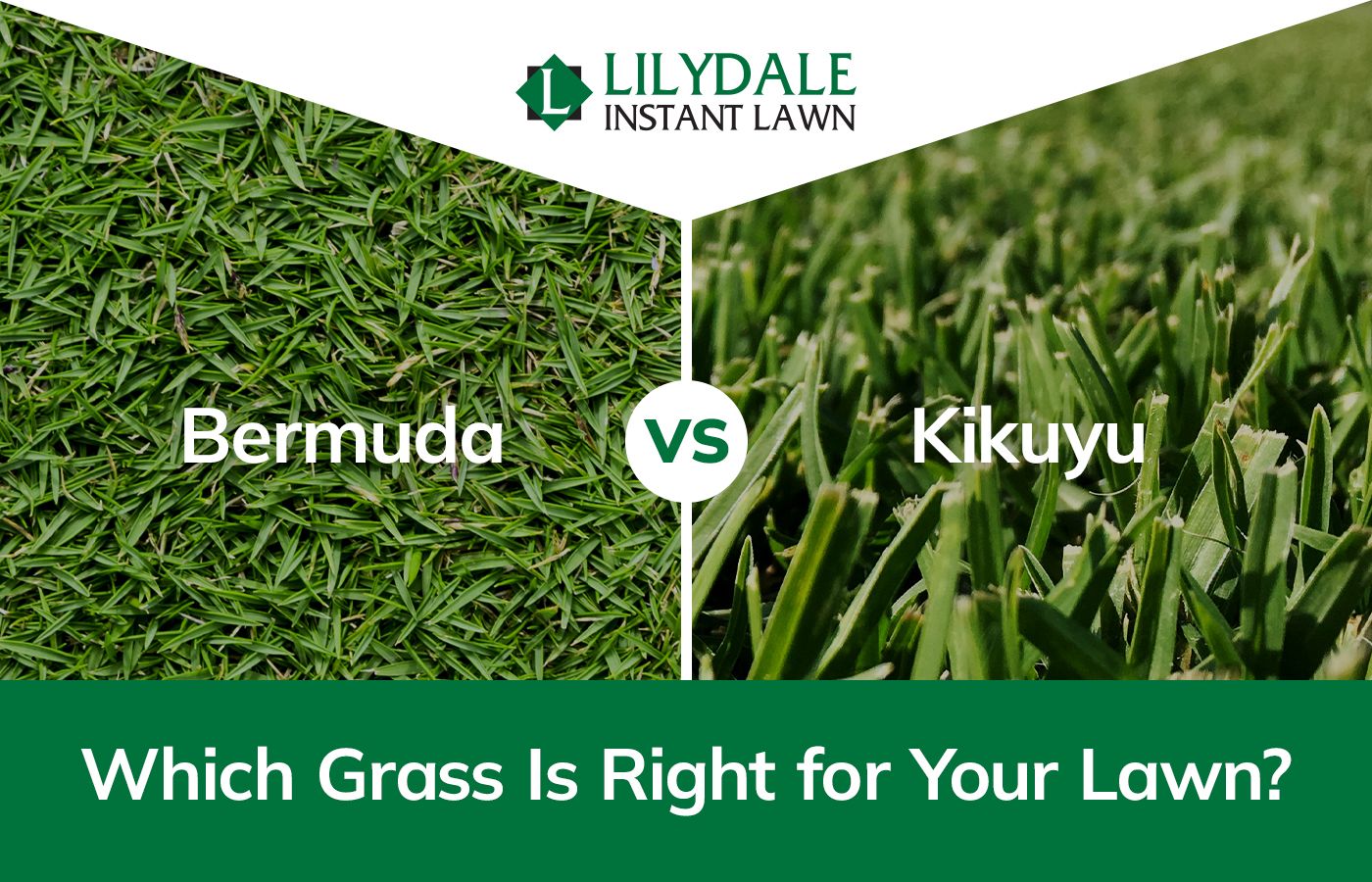7 ਮਿੰਟ ਪੜ੍ਹਿਆ
ਤੁਹਾਡੇ ਲਾਅਨ ਲਈ ਕਿਹੜਾ ਸਭ ਤੋਂ ਵਧੀਆ ਹੈ?
ਬਰਮੂਡਾ (ਜਾਂ ਸੋਫਾ) ਅਤੇ ਕਿਕੂਯੂ ਆਸਟ੍ਰੇਲੀਆ ਭਰ ਵਿੱਚ ਵਰਤੇ ਜਾਣ ਵਾਲੇ ਦੋ ਸਭ ਤੋਂ ਆਮ ਗਰਮ-ਮੌਸਮ ਦੇ ਮੈਦਾਨ ਹਨ। ਦੋਵੇਂ ਸਖ਼ਤ, ਸੋਕਾ-ਸਹਿਣਸ਼ੀਲ ਘਾਹ ਹਨ ਜੋ ਧੁੱਪ ਵਾਲੇ ਵਿਹੜੇ ਵਿੱਚ ਵਧਦੇ-ਫੁੱਲਦੇ ਹਨ, ਪਰ ਇਹ ਵਿਕਾਸ ਦੀਆਂ ਆਦਤਾਂ, ਰੱਖ-ਰਖਾਅ ਦੀਆਂ ਜ਼ਰੂਰਤਾਂ ਅਤੇ ਸਮੁੱਚੀ ਕਾਰਗੁਜ਼ਾਰੀ ਵਿੱਚ ਭਿੰਨ ਹਨ।
ਘਰ ਦੇ ਮਾਲਕਾਂ ਲਈ ਸਹੀ ਲਾਅਨ ਕਿਸਮ ਦੀ ਚੋਣ ਕਰਨ ਲਈ ਇਹਨਾਂ ਅੰਤਰਾਂ ਨੂੰ ਸਮਝਣਾ ਜ਼ਰੂਰੀ ਹੈ। ਇਸ ਗਾਈਡ ਵਿੱਚ, ਅਸੀਂ ਬਰਮੂਡਾ ਘਾਹ ਬਨਾਮ ਕਿਕੂਯੂ ਦੀ ਤੁਲਨਾ ਨਾਲ-ਨਾਲ ਕਰਾਂਗੇ, ਉਨ੍ਹਾਂ ਦੀਆਂ ਸ਼ਕਤੀਆਂ ਅਤੇ ਸੀਮਾਵਾਂ ਨੂੰ ਉਜਾਗਰ ਕਰਾਂਗੇ, ਅਤੇ ਦੱਸਾਂਗੇ ਕਿ ਕਿਹੜੀ ਮੈਦਾਨ ਦੀ ਕਿਸਮ ਵੱਖ-ਵੱਖ ਆਸਟ੍ਰੇਲੀਆਈ ਸਥਿਤੀਆਂ ਲਈ ਸਭ ਤੋਂ ਵਧੀਆ ਹੈ।
ਬਰਮੂਡਾ ਅਤੇ ਕਿਕੂਯੂ ਘਾਹ ਨੂੰ ਸਮਝਣਾ
ਬਰਮੂਡਾ ਘਾਹ, ਜੋ ਆਸਟ੍ਰੇਲੀਆ ਵਿੱਚ ਸੋਫਾ ਦੇ ਨਾਮ ਨਾਲ ਜਾਣੀ ਜਾਂਦੀ ਹੈ, ਇੱਕ ਬਰੀਕ ਪੱਤਿਆਂ ਵਾਲੀ, ਘੱਟ ਉੱਗਣ ਵਾਲੀ ਘਾਹ ਵਾਲੀ ਕਿਸਮ ਹੈ ਜੋ ਇਸਦੀ ਸੋਕੇ ਸਹਿਣਸ਼ੀਲਤਾ ਅਤੇ ਟਿਕਾਊਤਾ ਲਈ ਕੀਮਤੀ ਹੈ। ਆਧੁਨਿਕ ਕਿਸਮਾਂ ਜਿਵੇਂ ਕਿ ਟਿਫ਼ਟਫ਼ ਬਰਮੂਡਾ ਇਹਨਾਂ ਨੂੰ ਬੇਮਿਸਾਲ ਸੋਕਾ ਪ੍ਰਤੀਰੋਧ, ਡੂੰਘੀਆਂ ਜੜ੍ਹਾਂ ਵਾਲੀਆਂ ਪ੍ਰਣਾਲੀਆਂ, ਅਤੇ ਉੱਚ ਪਹਿਨਣ ਸਹਿਣਸ਼ੀਲਤਾ ਲਈ ਪੈਦਾ ਕੀਤਾ ਜਾਂਦਾ ਹੈ, ਜਿਸ ਨਾਲ ਇਹ ਗਰਮ, ਖੁਸ਼ਕ ਮੌਸਮ ਵਿੱਚ ਗੋਲਫ ਕੋਰਸਾਂ, ਖੇਡਾਂ ਦੇ ਮੈਦਾਨਾਂ ਅਤੇ ਰਿਹਾਇਸ਼ੀ ਵਿਹੜਿਆਂ ਵਿੱਚ ਪ੍ਰਸਿੱਧ ਬਣਦੇ ਹਨ।
ਕਿਕੂਯੂ ਘਾਹ ਇੱਕ ਜ਼ੋਰਦਾਰ, ਦਰਮਿਆਨੇ-ਪੱਤਿਆਂ ਵਾਲੀ ਕਿਸਮ ਹੈ ਜੋ ਜਲਦੀ ਸਥਾਪਿਤ ਹੁੰਦੀ ਹੈ ਅਤੇ ਤੇਜ਼ੀ ਨਾਲ ਵਧਣ ਵਾਲੇ ਦੌੜਾਕਾਂ ਵਿੱਚ ਫੈਲਦੀ ਹੈ। ਇਹ ਪੂਰੀ ਧੁੱਪ ਵਿੱਚ ਵਧਦੀ ਹੈ ਅਤੇ ਬਹੁਤ ਜ਼ਿਆਦਾ ਲਚਕੀਲੀ ਹੁੰਦੀ ਹੈ, ਇਸੇ ਕਰਕੇ ਇਸਨੂੰ ਵੱਡੇ ਲਾਅਨ, ਸਕੂਲਾਂ ਅਤੇ ਖੇਡ ਅੰਡਾਕਾਰ ਲਈ ਵਿਆਪਕ ਤੌਰ 'ਤੇ ਵਰਤਿਆ ਜਾਂਦਾ ਹੈ। ਹਾਲਾਂਕਿ, ਕਿਕੂਯੂ ਨੂੰ ਵਾਰ-ਵਾਰ ਕਟਾਈ ਦੀ ਲੋੜ ਹੁੰਦੀ ਹੈ ਅਤੇ ਜੇਕਰ ਸਹੀ ਢੰਗ ਨਾਲ ਦੇਖਭਾਲ ਨਾ ਕੀਤੀ ਜਾਵੇ ਤਾਂ ਇਹ ਹਮਲਾਵਰ ਬਣ ਸਕਦਾ ਹੈ, ਕਿਉਂਕਿ ਇਹ ਆਲੇ ਦੁਆਲੇ ਦੇ ਬਾਗ ਦੇ ਬਿਸਤਰਿਆਂ ਵਿੱਚ ਘੁੰਮਦਾ ਰਹਿੰਦਾ ਹੈ।
ਇਕੱਠੇ ਮਿਲ ਕੇ, ਬਰਮੂਡਾ ਅਤੇ ਕਿਕੂਯੂ ਆਸਟ੍ਰੇਲੀਆ ਵਿੱਚ ਦੋ ਸਭ ਤੋਂ ਵੱਧ ਵਰਤੇ ਜਾਣ ਵਾਲੇ ਗਰਮ-ਮੌਸਮ ਦੇ ਮੈਦਾਨ ਹਨ, ਹਰ ਇੱਕ ਵੱਖ-ਵੱਖ ਲਾਅਨ ਸਥਿਤੀਆਂ ਲਈ ਵਿਲੱਖਣ ਸ਼ਕਤੀਆਂ ਦੀ ਪੇਸ਼ਕਸ਼ ਕਰਦਾ ਹੈ।
ਆਸਟ੍ਰੇਲੀਆ ਦੇ ਜਲਵਾਯੂ ਨੂੰ ਕਿਸ ਘਾਹ ਨੇ ਬਿਹਤਰ ਢੰਗ ਨਾਲ ਸੰਭਾਲਿਆ: ਬਰਮੂਡਾ ਜਾਂ ਕਿਕੂਯੂ?
ਬਰਮੂਡਾ (ਸੋਫਾ) ਆਮ ਤੌਰ 'ਤੇ ਆਸਟ੍ਰੇਲੀਆਈ ਸੋਕੇ ਦੀਆਂ ਸਥਿਤੀਆਂ ਨੂੰ ਕਿਕੂਯੂ ਨਾਲੋਂ ਬਿਹਤਰ ਢੰਗ ਨਾਲ ਸੰਭਾਲਦਾ ਹੈ ਕਿਉਂਕਿ ਇਸਦੀ ਡੂੰਘੀਆਂ ਜੜ੍ਹਾਂ, ਪਾਣੀ-ਕੁਸ਼ਲ ਵਿਕਾਸ ਹੈ। ਟਿਫਟੂਫ ਬਰਮੂਡਾ ਹੈ ਉੱਚ ਸੋਕੇ ਸਹਿਣਸ਼ੀਲਤਾ ਲਈ ਪੈਦਾ ਕੀਤਾ ਗਿਆ ਅਤੇ ਗਰਮ, ਸੁੱਕੇ ਖੇਤਰਾਂ ਵਿੱਚ ਭਰੋਸੇਯੋਗਤਾ ਨਾਲ ਪ੍ਰਦਰਸ਼ਨ ਕਰਦਾ ਹੈ। ਕਿਕੂਯੂ ਗਰਮੀ ਦਾ ਚੰਗੀ ਤਰ੍ਹਾਂ ਮੁਕਾਬਲਾ ਕਰਦਾ ਹੈ ਪਰ ਆਮ ਤੌਰ 'ਤੇ ਲੰਬੇ ਸਮੇਂ ਤੱਕ ਸੁੱਕੇ ਸਮੇਂ ਵਿੱਚ ਰੰਗ ਅਤੇ ਘਣਤਾ ਬਣਾਈ ਰੱਖਣ ਲਈ ਵਧੇਰੇ ਪਾਣੀ ਦੀ ਲੋੜ ਹੁੰਦੀ ਹੈ।
- ਸੋਕਾ ਸਹਿਣਸ਼ੀਲਤਾ ਅਤੇ ਪਾਣੀ ਦੀ ਕੁਸ਼ਲਤਾ: ਬਰਮੂਡਾ ਲਾਅਨ (ਖਾਸ ਕਰਕੇ ਟਿਫਟੂਫ ਬਰਮੂਡਾ) ਬਹੁਤ ਜ਼ਿਆਦਾ ਸੋਕਾ ਸਹਿਣਸ਼ੀਲ ਹਨ ਅਤੇ ਪਾਬੰਦੀਆਂ ਅਧੀਨ ਘੱਟ ਪਾਣੀ ਦੀ ਵਰਤੋਂ ਕਰਦੇ ਹਨ; ਕਿਕੂਯੂ ਸਖ਼ਤ ਹੈ ਪਰ ਸਿੰਚਾਈ ਅਤੇ ਖਾਦ ਤੋਂ ਬਿਨਾਂ ਲੰਬੇ ਸੋਕੇ ਦੌਰਾਨ ਪਤਲਾ ਜਾਂ ਪੀਲਾ ਹੋ ਸਕਦਾ ਹੈ।
- ਛਾਂ ਸਹਿਣਸ਼ੀਲਤਾ: ਦੋਵੇਂ ਧੁੱਪ ਪਸੰਦ ਕਰਦੇ ਹਨ, ਪਰ ਬਰਮੂਡਾ ਹਲਕੇ ਛਾਂ ਦਾ ਪ੍ਰਬੰਧ ਮੱਧਮ ਕਰਦਾ ਹੈ; ਕਿਕੂਯੂ ਪੂਰੀ ਤਰ੍ਹਾਂ ਧੁੱਪ ਵਾਲਾ ਹੁੰਦਾ ਹੈ ਅਤੇ ਛਾਂ ਵਿੱਚ ਧੱਬੇਦਾਰ ਹੋ ਜਾਂਦਾ ਹੈ।
- ਸਭ ਤੋਂ ਵਧੀਆ ਫਿੱਟ: ਗਰਮ, ਸੁੱਕੇ ਖੇਤਰਾਂ ਵਿੱਚ ਪਾਣੀ-ਕੁਸ਼ਲ, ਸੋਕਾ-ਸਹਿਣਸ਼ੀਲ ਲਾਅਨ ਲਈ ਬਰਮੂਡਾ ਚੁਣੋ; ਧੁੱਪ ਵਾਲੇ ਵਿਹੜੇ ਲਈ ਕਿਕੂਯੂ ਚੁਣੋ ਜਿੱਥੇ ਤੇਜ਼ ਕਵਰੇਜ ਅਤੇ ਘਿਸਾਈ ਰਿਕਵਰੀ ਤਰਜੀਹਾਂ ਹਨ।
ਵਿਕਾਸ ਦੀਆਂ ਆਦਤਾਂ ਅਤੇ ਦੇਖਭਾਲ ਦੀਆਂ ਜ਼ਰੂਰਤਾਂ
ਬਰਮੂਡਾ ਅਤੇ ਕਿਕੂਯੂ ਲਾਅਨ ਇਸ ਗੱਲ ਵਿੱਚ ਭਿੰਨ ਹਨ ਕਿ ਉਹ ਕਿਵੇਂ ਵਧਦੇ ਹਨ, ਫੈਲਦੇ ਹਨ, ਅਤੇ ਉਹਨਾਂ ਦੀ ਦੇਖਭਾਲ ਦੀ ਲੋੜ ਹੁੰਦੀ ਹੈ। ਹੇਠਾਂ ਦਿੱਤੀ ਸਾਰਣੀ ਘਰ ਦੇ ਮਾਲਕਾਂ ਨੂੰ ਧਿਆਨ ਵਿੱਚ ਰੱਖਣ ਵਾਲੇ ਮੁੱਖ ਰੱਖ-ਰਖਾਅ ਦੇ ਕਾਰਕਾਂ ਨੂੰ ਉਜਾਗਰ ਕਰਦੀ ਹੈ:
| ਵਿਸ਼ੇਸ਼ਤਾ | ਬਰਮੂਡਾ ਘਾਹ | ਕਿਕੂਯੂ ਘਾਹ |
|---|---|---|
| ਵਾਧੇ ਦੀ ਆਦਤ | ਬਾਰੀਕ ਪੱਤਿਆਂ ਵਾਲਾ, ਘੱਟ ਉੱਗਣ ਵਾਲਾ, ਸੰਘਣਾ ਚਟਾਈ। | ਦਰਮਿਆਨੇ ਪੱਤਿਆਂ ਵਾਲੇ, ਜ਼ੋਰਦਾਰ, ਤੇਜ਼ੀ ਨਾਲ ਫੈਲਣ ਵਾਲੇ ਦੌੜਾਕ |
| ਕਟਾਈ ਦੀ ਬਾਰੰਬਾਰਤਾ | ਦਰਮਿਆਨਾ; ਹੌਲੀ ਵਿਕਾਸ ਦਾ ਮਤਲਬ ਹੈ ਘੱਟ ਕਟਾਈ। | ਉੱਚਾ, ਵਾਰ-ਵਾਰ ਕਟਾਈ ਦੀ ਲੋੜ ਹੁੰਦੀ ਹੈ, ਖਾਸ ਕਰਕੇ ਗਰਮ ਮਹੀਨਿਆਂ ਵਿੱਚ। |
| ਹਮਲਾਵਰਤਾ | ਘੱਟ ਹਮਲਾਵਰ, ਸਥਿਰ ਫੈਲਦਾ ਹੈ ਪਰ ਕੰਟਰੋਲਯੋਗ। | ਬਹੁਤ ਜ਼ਿਆਦਾ ਹਮਲਾਵਰ, ਅਕਸਰ ਬਾਗ ਦੇ ਬਿਸਤਰਿਆਂ ਅਤੇ ਰਸਤਿਆਂ ਵਿੱਚ ਘੁੰਮਦਾ ਰਹਿੰਦਾ ਹੈ। |
| ਥੈਚ ਬਿਲਡ-ਅੱਪ | ਘੱਟੋ-ਘੱਟ ਜੇਕਰ ਸਹੀ ਢੰਗ ਨਾਲ ਸੰਭਾਲਿਆ ਜਾਵੇ। | ਇਹ ਜਲਦੀ ਹੀ ਘਾਹ ਫੂਸ ਬਣਾਉਂਦਾ ਹੈ, ਇਸ ਲਈ ਨਿਯਮਤ ਤੌਰ 'ਤੇ ਛਾਂਟੀ ਕਰਨ ਦੀ ਲੋੜ ਹੁੰਦੀ ਹੈ। |
| ਖਾਦ ਦੀਆਂ ਲੋੜਾਂ | ਸੰਤੁਲਿਤ ਖਾਦ ਤੋਂ ਲਾਭ, ਪਰ ਕੁੱਲ ਨਿਵੇਸ਼ ਘੱਟ। | ਹਰੇ-ਭਰੇ ਅਤੇ ਹਰੇ ਰਹਿਣ ਲਈ ਵਧੇਰੇ ਖਾਦ ਦੀ ਲੋੜ ਹੁੰਦੀ ਹੈ। |
| ਰੱਖ-ਰਖਾਅ ਦਾ ਪੱਧਰ | ਘੱਟ ਰੱਖ-ਰਖਾਅ, ਸਾਫ਼-ਸੁਥਰੇ, ਸੋਕੇ-ਸਹਿਣਸ਼ੀਲ ਲਾਅਨ ਦੀ ਇੱਛਾ ਰੱਖਣ ਵਾਲੇ ਘਰਾਂ ਦੇ ਮਾਲਕਾਂ ਲਈ ਬਿਹਤਰ ਅਨੁਕੂਲ। | ਜ਼ਿਆਦਾ ਦੇਖਭਾਲ, ਵੱਡੀਆਂ ਧੁੱਪ ਵਾਲੀਆਂ ਥਾਵਾਂ ਲਈ ਬਿਹਤਰ ਜਿੱਥੇ ਦੇਖਭਾਲ ਦਾ ਪ੍ਰਬੰਧਨ ਕੀਤਾ ਜਾ ਸਕਦਾ ਹੈ। |
ਟਿਕਾਊਤਾ ਅਤੇ ਪਹਿਨਣ ਸਹਿਣਸ਼ੀਲਤਾ

ਜਦੋਂ ਭਾਰੀ ਵਰਤੋਂ ਦੀ ਗੱਲ ਆਉਂਦੀ ਹੈ, ਤਾਂ ਬਰਮੂਡਾ ਅਤੇ ਕਿਕੂਯੂ ਦੋਵੇਂ ਸਖ਼ਤ ਗਰਮ ਮੌਸਮ ਦੇ ਘਾਹ ਹਨ। ਇੱਥੇ ਵਿਚਾਰਨ ਲਈ ਮੁੱਖ ਨੁਕਤੇ ਹਨ:
- ਉੱਚ ਪਹਿਨਣ ਸਹਿਣਸ਼ੀਲਤਾ: ਦੋਵੇਂ ਘਾਹ ਬੱਚਿਆਂ, ਪਾਲਤੂ ਜਾਨਵਰਾਂ ਅਤੇ ਬਾਗ਼ ਦੀ ਨਿਯਮਤ ਵਰਤੋਂ ਤੋਂ ਪੈਦਲ ਆਵਾਜਾਈ ਦਾ ਸਾਹਮਣਾ ਕਰ ਸਕਦੇ ਹਨ।
- ਖੇਡ ਖੇਤਰ ਵਿੱਚ ਪ੍ਰਦਰਸ਼ਨ: ਬਰਮੂਡਾ (ਸੋਫਾ) ਗੋਲਫ ਕੋਰਸਾਂ ਅਤੇ ਪੇਸ਼ੇਵਰ ਖੇਡ ਮੈਦਾਨਾਂ ਵਿੱਚ ਇਸਦੀ ਵਧੀਆ ਬਣਤਰ ਅਤੇ ਇਕਸਾਰ ਸਤ੍ਹਾ ਲਈ ਵਿਆਪਕ ਤੌਰ 'ਤੇ ਵਰਤਿਆ ਜਾਂਦਾ ਹੈ। ਕਿਕੂਯੂ ਨੂੰ ਅਕਸਰ ਕਮਿਊਨਿਟੀ ਅੰਡਾਕਾਰ ਅਤੇ ਸਕੂਲ ਦੇ ਮੈਦਾਨਾਂ ਲਈ ਚੁਣਿਆ ਜਾਂਦਾ ਹੈ ਕਿਉਂਕਿ ਇਹ ਪਹਿਨਣ ਤੋਂ ਬਾਅਦ ਜਲਦੀ ਠੀਕ ਹੋ ਜਾਂਦਾ ਹੈ।
- ਸਵੈ-ਮੁਰੰਮਤ ਕਰਨ ਦੀ ਸਮਰੱਥਾ: ਬਰਮੂਡਾ ਵਿੱਚ ਆਪਣੀ ਸੰਘਣੀ, ਬਰੀਕ ਪੱਤਿਆਂ ਵਾਲੀ ਬਣਤਰ ਦੇ ਕਾਰਨ ਸ਼ਾਨਦਾਰ ਸਵੈ-ਮੁਰੰਮਤ ਗੁਣ ਹਨ। ਕਿਕੂਯੂ ਵੀ ਜਲਦੀ ਵਧਦਾ ਹੈ। ਪਰ ਹਮਲਾਵਰ ਦੌੜਾਕਾਂ 'ਤੇ ਨਿਰਭਰ ਕਰਦਾ ਹੈ ਜੋ ਬਾਗ ਦੇ ਬਿਸਤਰਿਆਂ 'ਤੇ ਹਮਲਾ ਕਰ ਸਕਦੇ ਹਨ।
- ਮੌਸਮੀ ਲਚਕਤਾ: ਬਰਮੂਡਾ ਲਾਅਨ ਸਹੀ ਦੇਖਭਾਲ ਨਾਲ ਸਾਰੇ ਮੌਸਮਾਂ ਵਿੱਚ ਆਪਣੀ ਟਿਕਾਊਤਾ ਬਣਾਈ ਰੱਖਦੇ ਹਨ। ਕਿਕੂਯੂ ਲਾਅਨ ਗਰਮੀਆਂ ਵਿੱਚ ਜਲਦੀ ਵਾਪਸ ਉੱਗਦੇ ਹਨ ਪਰ ਠੰਢੇ ਮਹੀਨਿਆਂ ਵਿੱਚ ਪਤਲੇ ਹੋ ਸਕਦੇ ਹਨ।

ਦੋਵੇਂ ਘਾਹ ਜ਼ਿਆਦਾ ਆਵਾਜਾਈ ਵਾਲੇ ਖੇਤਰਾਂ ਲਈ ਮਜ਼ਬੂਤ ਵਿਕਲਪ ਹਨ, ਪਰ ਚੋਣ ਇਸ ਗੱਲ 'ਤੇ ਨਿਰਭਰ ਕਰਦੀ ਹੈ ਕਿ ਤੁਸੀਂ ਬਰਮੂਡਾ ਦੇ ਵਧੀਆ, ਖੇਡਾਂ ਲਈ ਤਿਆਰ ਫਿਨਿਸ਼ ਨੂੰ ਤਰਜੀਹ ਦਿੰਦੇ ਹੋ ਜਾਂ ਕਿਕੂਯੂ ਦੀ ਜਲਦੀ ਰਿਕਵਰੀ ਅਤੇ ਕਠੋਰਤਾ ਨੂੰ।
ਸੁਹਜਾਤਮਕ ਅਪੀਲ: ਰੰਗ, ਬਣਤਰ, ਅਤੇ ਅਹਿਸਾਸ
ਤੁਹਾਡੇ ਲਾਅਨ ਦੀ ਦਿੱਖ ਅਤੇ ਅਹਿਸਾਸ ਇਸਦੀ ਮਜ਼ਬੂਤੀ ਜਾਂ ਸੋਕੇ ਦੀ ਸਹਿਣਸ਼ੀਲਤਾ ਜਿੰਨਾ ਹੀ ਮਹੱਤਵਪੂਰਨ ਹੋ ਸਕਦਾ ਹੈ। ਬਰਮੂਡਾ ਘਾਹ, ਜਿਸਨੂੰ ਸੋਫਾ ਵੀ ਕਿਹਾ ਜਾਂਦਾ ਹੈ, ਵਿੱਚ ਇੱਕ ਬਰੀਕ ਪੱਤਾ ਬਲੇਡ ਹੁੰਦਾ ਹੈ ਜੋ ਇੱਕ ਨਿਰਵਿਘਨ, ਕਾਰਪੇਟ ਵਰਗਾ ਫਿਨਿਸ਼ ਬਣਾਉਂਦਾ ਹੈ। ਇਹ ਪੈਰਾਂ ਹੇਠ ਨਰਮ ਮਹਿਸੂਸ ਹੁੰਦਾ ਹੈ, ਜੋ ਉਹਨਾਂ ਪਰਿਵਾਰਾਂ ਲਈ ਆਰਾਮਦਾਇਕ ਬਣਾਉਂਦਾ ਹੈ ਜੋ ਬਾਹਰ ਬਹੁਤ ਸਾਰਾ ਸਮਾਂ ਬਿਤਾਉਂਦੇ ਹਨ।
ਸਹੀ ਦੇਖਭਾਲ ਦੇ ਨਾਲ, ਬਰਮੂਡਾ ਲਾਅਨ ਆਪਣੇ ਰੰਗ ਨੂੰ ਚੰਗੀ ਤਰ੍ਹਾਂ ਫੜੀ ਰੱਖਦੇ ਹਨ ਅਤੇ ਇੱਕ ਸਾਫ਼-ਸੁਥਰਾ, ਮੈਨੀਕਿਓਰਡ ਦਿੱਖ ਬਣਾਈ ਰੱਖਦੇ ਹਨ ਜੋ ਗੋਲਫ ਕੋਰਸ ਦੀਆਂ ਸਤਹਾਂ ਵਰਗਾ ਹੁੰਦਾ ਹੈ।
ਇਸ ਦੇ ਉਲਟ, ਕਿਕੂਯੂ ਘਾਹ ਦਾ ਪੱਤਾ ਦਰਮਿਆਨਾ ਹੁੰਦਾ ਹੈ ਜੋ ਇਸਨੂੰ ਥੋੜ੍ਹਾ ਮੋਟਾ ਬਣਾਵਟ ਦਿੰਦਾ ਹੈ। ਗਰਮ ਮਹੀਨਿਆਂ ਦੌਰਾਨ ਇਸਦਾ ਚਮਕਦਾਰ ਹਰਾ ਰੰਗ ਆਕਰਸ਼ਕ ਹੁੰਦਾ ਹੈ, ਪਰ ਸਰਦੀਆਂ ਵਿੱਚ ਇਹ ਆਪਣੀ ਜੀਵੰਤਤਾ ਗੁਆ ਸਕਦਾ ਹੈ ਜਦੋਂ ਤੱਕ ਖਾਦ ਨਾਲ ਸਮਰਥਨ ਨਾ ਕੀਤਾ ਜਾਵੇ। ਕਿਕੂਯੂ ਦੇ ਤੇਜ਼ ਵਾਧੇ ਦੇ ਨਤੀਜੇ ਵਜੋਂ ਅਕਸਰ ਇੱਕ ਮੋਟਾ, ਵਧੇਰੇ ਮਜ਼ਬੂਤ ਦਿੱਖ ਹੁੰਦਾ ਹੈ, ਜੋ ਕਿ ਵੱਡੀਆਂ ਖੁੱਲ੍ਹੀਆਂ ਥਾਵਾਂ ਦੇ ਅਨੁਕੂਲ ਹੁੰਦਾ ਹੈ ਪਰ ਬਰਮੂਡਾ ਦੇ ਤੰਗ ਫਿਨਿਸ਼ ਨਾਲੋਂ ਘੱਟ ਸ਼ੁੱਧ ਦਿਖਾਈ ਦੇ ਸਕਦਾ ਹੈ।
ਦੋਵਾਂ ਵਿੱਚੋਂ ਚੋਣ ਕਰਦੇ ਸਮੇਂ, ਵਿਚਾਰ ਕਰੋ ਕਿ ਕੀ ਤੁਸੀਂ ਬਰਮੂਡਾ ਦੇ ਬਾਰੀਕ ਪੱਤਿਆਂ ਵਾਲੇ, ਪੇਸ਼ੇਵਰ ਸੁਹਜ ਨੂੰ ਤਰਜੀਹ ਦਿੰਦੇ ਹੋ ਜਾਂ ਕਿਕੂਯੂ ਦੇ ਹਰੇ ਭਰੇ, ਜੋਸ਼ੀਲੇ ਦਿੱਖ ਨੂੰ ਜੋ ਧੁੱਪ ਵਾਲੇ ਵਿਹੜੇ ਵਿੱਚ ਵਧਦਾ-ਫੁੱਲਦਾ ਹੈ।
ਬਰਮੂਡਾ ਬਨਾਮ ਕਿਕੂਯੂ ਕਦੋਂ ਚੁਣਨਾ ਹੈ
ਜੇਕਰ ਤੁਸੀਂ ਬਰਮੂਡਾ ਅਤੇ ਕਿਕੂਯੂ ਵਿਚਕਾਰ ਫੈਸਲਾ ਕਰ ਰਹੇ ਹੋ, ਤਾਂ ਇੱਥੇ ਉਹ ਸਥਿਤੀਆਂ ਹਨ ਜਿੱਥੇ ਹਰੇਕ ਘਾਹ ਦੀ ਕਿਸਮ ਸਭ ਤੋਂ ਵਧੀਆ ਫਿੱਟ ਹੈ:
ਬਰਮੂਡਾ ਘਾਹ (ਸੋਫਾ) ਚੁਣੋ ਜੇਕਰ:
- ਤੁਸੀਂ ਸੋਕੇ ਵਾਲੇ ਇਲਾਕੇ ਵਿੱਚ ਰਹਿੰਦੇ ਹੋ ਅਤੇ ਸੋਕੇ ਨੂੰ ਸਹਿਣ ਕਰਨ ਵਾਲਾ ਲਾਅਨ ਚਾਹੁੰਦੇ ਹੋ ਜੋ ਘੱਟ ਪਾਣੀ ਦੀ ਵਰਤੋਂ ਕਰਦਾ ਹੈ।
- ਤੁਸੀਂ ਗੋਲਫ ਕੋਰਸ ਦੇ ਮੈਦਾਨ ਵਾਂਗ, ਮੈਨੀਕਿਓਰ ਦਿੱਖ ਵਾਲਾ ਬਰੀਕ ਪੱਤਿਆਂ ਵਾਲਾ ਘਾਹ ਪਸੰਦ ਕਰਦੇ ਹੋ।
- ਤੁਸੀਂ ਘੱਟ ਰੱਖ-ਰਖਾਅ ਚਾਹੁੰਦੇ ਹੋ, ਦਰਮਿਆਨੀ ਕਟਾਈ ਅਤੇ ਘੱਟ ਘਾਹ ਫੂਸ ਦਾ ਨਿਰਮਾਣ।
- ਤੁਹਾਡੇ ਵਿਹੜੇ ਨੂੰ ਪੂਰੀ ਧੁੱਪ ਜਾਂ ਹਲਕੀ ਛਾਂ ਮਿਲਦੀ ਹੈ।
ਕਿਕੂਯੂ ਘਾਹ ਚੁਣੋ ਜੇਕਰ:
- ਤੁਹਾਨੂੰ ਵੱਡੇ, ਧੁੱਪ ਵਾਲੇ ਲਾਅਨ ਜਾਂ ਖੁੱਲ੍ਹੀਆਂ ਥਾਵਾਂ ਲਈ ਤੇਜ਼ ਕਵਰੇਜ ਦੀ ਲੋੜ ਹੈ।
- ਤੁਸੀਂ ਇੱਕ ਬਜਟ-ਅਨੁਕੂਲ ਘਾਹ ਵਾਲੀ ਕਿਸਮ ਦੀ ਭਾਲ ਕਰ ਰਹੇ ਹੋ ਜੋ ਜਲਦੀ ਜੜ੍ਹ ਫੜ ਲੈਂਦੀ ਹੈ।
- ਤੁਹਾਡੇ ਲਾਅਨ ਵਿੱਚ ਬੱਚਿਆਂ, ਪਾਲਤੂ ਜਾਨਵਰਾਂ, ਜਾਂ ਕਮਿਊਨਿਟੀ ਵਰਤੋਂ ਤੋਂ ਭਾਰੀ ਪੈਦਲ ਆਵਾਜਾਈ ਆਉਂਦੀ ਹੈ।
- ਤੁਹਾਨੂੰ ਬਾਗ਼ ਦੇ ਬਿਸਤਰਿਆਂ ਦੇ ਨੇੜੇ ਵਾਰ-ਵਾਰ ਕਟਾਈ ਕਰਨ ਅਤੇ ਹਮਲਾਵਰ ਦੌੜਾਕਾਂ ਦਾ ਪ੍ਰਬੰਧਨ ਕਰਨ ਵਿੱਚ ਕੋਈ ਇਤਰਾਜ਼ ਨਹੀਂ ਹੈ।
ਇਹਨਾਂ ਦ੍ਰਿਸ਼ਾਂ ਨੂੰ ਤੋਲ ਕੇ, ਤੁਸੀਂ ਆਪਣੀ ਜੀਵਨ ਸ਼ੈਲੀ, ਵਿਹੜੇ ਦੀਆਂ ਸਥਿਤੀਆਂ ਅਤੇ ਰੱਖ-ਰਖਾਅ ਦੀਆਂ ਤਰਜੀਹਾਂ ਦੇ ਅਨੁਸਾਰ ਸਹੀ ਘਾਹ ਦੀ ਕਿਸਮ ਦਾ ਮੇਲ ਕਰ ਸਕਦੇ ਹੋ।
ਅਕਸਰ ਪੁੱਛੇ ਜਾਣ ਵਾਲੇ ਸਵਾਲ
ਕੀ ਬਰਮੂਡਾ ਘਾਹ ਕਿਕੂਯੂ ਨਾਲੋਂ ਸੋਕਾ ਸਹਿਣਸ਼ੀਲ ਹੈ?
ਹਾਂ, ਬਰਮੂਡਾ ਘਾਹ, ਖਾਸ ਕਰਕੇ ਟਿਫਟੂਫ ਬਰਮੂਡਾ, ਕਿਕੂਯੂ ਨਾਲੋਂ ਜ਼ਿਆਦਾ ਸੋਕਾ ਸਹਿਣਸ਼ੀਲਤਾ ਰੱਖਦਾ ਹੈ। ਇਸਦੀ ਡੂੰਘੀ ਜੜ੍ਹਾਂ ਵਾਲੀ ਪ੍ਰਣਾਲੀ ਇਸਨੂੰ ਘੱਟ ਪਾਣੀ ਨਾਲ ਲੰਬੇ ਸੋਕੇ ਦੇ ਦੌਰ ਤੋਂ ਬਚਣ ਦੀ ਆਗਿਆ ਦਿੰਦੀ ਹੈ, ਜਦੋਂ ਕਿ ਕਿਕੂਯੂ ਨੂੰ ਆਮ ਤੌਰ 'ਤੇ ਸੋਕੇ ਦੀਆਂ ਸਥਿਤੀਆਂ ਦੌਰਾਨ ਆਪਣੀ ਘਣਤਾ ਅਤੇ ਰੰਗ ਬਣਾਈ ਰੱਖਣ ਲਈ ਜ਼ਿਆਦਾ ਵਾਰ ਪਾਣੀ ਦੇਣ ਦੀ ਲੋੜ ਹੁੰਦੀ ਹੈ।
ਕਿਹੜਾ ਘਾਹ ਤੇਜ਼ੀ ਨਾਲ ਉੱਗਦਾ ਹੈ, ਬਰਮੂਡਾ ਜਾਂ ਕਿਕੂਯੂ?
ਕਿਕੂਯੂ ਬਰਮੂਡਾ ਘਾਹ ਨਾਲੋਂ ਤੇਜ਼ੀ ਨਾਲ ਉੱਗਦਾ ਹੈ। ਇਹ ਤੇਜ਼ੀ ਨਾਲ ਸਥਾਪਿਤ ਹੁੰਦਾ ਹੈ, ਦੌੜਾਕਾਂ ਨਾਲ ਹਮਲਾਵਰ ਢੰਗ ਨਾਲ ਫੈਲਦਾ ਹੈ, ਅਤੇ ਰਿਕਾਰਡ ਸਮੇਂ ਵਿੱਚ ਨੰਗੇ ਹਿੱਸਿਆਂ ਨੂੰ ਢੱਕ ਲੈਂਦਾ ਹੈ। ਬਰਮੂਡਾ ਦੀ ਵਿਕਾਸ ਦਰ ਥੋੜ੍ਹੀ ਹੌਲੀ ਹੁੰਦੀ ਹੈ ਪਰ ਇੱਕ ਵਾਰ ਸਥਾਪਿਤ ਹੋਣ ਤੋਂ ਬਾਅਦ ਇੱਕ ਸੰਘਣਾ, ਬਰੀਕ ਪੱਤਿਆਂ ਵਾਲਾ ਲਾਅਨ ਬਣਾਉਂਦਾ ਹੈ।
ਕੀ ਕਿਕੂਯੂ ਬਰਮੂਡਾ ਦੇ ਲਾਅਨ 'ਤੇ ਕਬਜ਼ਾ ਕਰ ਲੈਂਦਾ ਹੈ?
ਹਾਂ, ਜੇਕਰ ਕੰਟਰੋਲ ਨਾ ਕੀਤਾ ਜਾਵੇ ਤਾਂ ਕਿਕੂਯੂ ਬਰਮੂਡਾ ਦੇ ਲਾਅਨ ਨੂੰ ਪਛਾੜ ਸਕਦਾ ਹੈ। ਇਸਦੇ ਤੇਜ਼ੀ ਨਾਲ ਫੈਲਣ ਵਾਲੇ ਸਟੋਲਨ ਅਤੇ ਰਾਈਜ਼ੋਮ ਆਲੇ ਦੁਆਲੇ ਦੇ ਮੈਦਾਨ 'ਤੇ ਹਮਲਾ ਕਰ ਸਕਦੇ ਹਨ, ਜਿਸ ਲਈ ਨਿਯਮਤ ਕਟਾਈ, ਕਿਨਾਰੇ, ਜਾਂ ਚੋਣਵੇਂ ਜੜੀ-ਬੂਟੀਆਂ ਦੇ ਇਲਾਜ ਦੀ ਲੋੜ ਹੁੰਦੀ ਹੈ।
ਖੇਡ ਦੇ ਮੈਦਾਨਾਂ ਅਤੇ ਜ਼ਿਆਦਾ ਆਵਾਜਾਈ ਵਾਲੇ ਖੇਤਰਾਂ ਲਈ ਕਿਹੜਾ ਘਾਹ ਵਧੀਆ ਹੈ?
ਦੋਵੇਂ ਟਿਕਾਊ ਹਨ, ਪਰ ਬਰਮੂਡਾ ਨੂੰ ਅਕਸਰ ਉੱਚ ਪੱਧਰੀ ਖੇਡ ਮੈਦਾਨਾਂ ਲਈ ਤਰਜੀਹ ਦਿੱਤੀ ਜਾਂਦੀ ਹੈ , ਜਦੋਂ ਕਿ ਕਿਕੂਯੂ ਕਮਿਊਨਿਟੀ ਮੈਦਾਨਾਂ ਦੇ ਅਨੁਕੂਲ ਹੈ। ਬਰਮੂਡਾ ਗੋਲਫ ਕੋਰਸਾਂ ਅਤੇ ਸਟੇਡੀਅਮਾਂ ਲਈ ਇੱਕ ਵਧੀਆ, ਇਕਸਾਰ ਖੇਡ ਸਤਹ ਪ੍ਰਦਾਨ ਕਰਦਾ ਹੈ, ਜਦੋਂ ਕਿ ਕਿਕੂਯੂ ਭਾਰੀ ਘਿਸਾਅ ਤੋਂ ਤੇਜ਼ੀ ਨਾਲ ਠੀਕ ਹੋ ਜਾਂਦਾ ਹੈ, ਜਿਸ ਨਾਲ ਇਹ ਅੰਡਾਕਾਰ, ਸਕੂਲਾਂ ਅਤੇ ਜਨਤਕ ਥਾਵਾਂ ਲਈ ਪ੍ਰਸਿੱਧ ਹੋ ਜਾਂਦਾ ਹੈ।
ਆਪਣੇ ਲਾਅਨ ਲਈ ਸਹੀ ਘਾਹ ਲੱਭਣਾ
ਦਿਨ ਦੇ ਅੰਤ ਵਿੱਚ, ਸਹੀ ਲਾਅਨ ਇਸ ਗੱਲ 'ਤੇ ਨਿਰਭਰ ਕਰਦਾ ਹੈ ਕਿ ਤੁਸੀਂ ਕਿਵੇਂ ਰਹਿੰਦੇ ਹੋ ਅਤੇ ਤੁਹਾਡੇ ਵਿਹੜੇ ਨੂੰ ਸਭ ਤੋਂ ਵੱਧ ਕਿਸ ਚੀਜ਼ ਦੀ ਲੋੜ ਹੈ। ਕੁਝ ਘਰ ਦੇ ਮਾਲਕ ਬਰਮੂਡਾ ਲਾਅਨ ਦੇ ਸਾਫ਼-ਸੁਥਰੇ, ਸੁੰਦਰ ਦਿੱਖ ਦੀ ਕਦਰ ਕਰਦੇ ਹਨ, ਜਦੋਂ ਕਿ ਦੂਸਰੇ ਕਿਕੂਯੂ ਦੇ ਹਰੇ ਭਰੇ, ਜ਼ੋਰਦਾਰ ਵਾਧੇ ਨੂੰ ਤਰਜੀਹ ਦਿੰਦੇ ਹਨ।
ਜੇਕਰ ਤੁਸੀਂ ਆਪਣੀ ਜੀਵਨ ਸ਼ੈਲੀ ਦੇ ਅਨੁਕੂਲ ਲਾਅਨ ਬਣਾਉਣ ਲਈ ਤਿਆਰ ਹੋ, ਤਾਂ ਲਿਲੀਡੇਲ ਇੰਸਟੈਂਟ ਲਾਅਨ ਤੁਹਾਨੂੰ ਚੋਣ ਕਰਨ ਅਤੇ ਇਸਨੂੰ ਜੀਵਨ ਵਿੱਚ ਲਿਆਉਣ ਵਿੱਚ ਮਦਦ ਕਰ ਸਕਦਾ ਹੈ। ਸੋਕੇ ਵਾਲੇ ਖੇਤਰਾਂ ਲਈ ਟਿਫਟੂਫ ਬਰਮੂਡਾ ਤੋਂ ਯੂਰੇਕਾ ਪ੍ਰੀਮੀਅਮ ਵੀਜੀ ਕਿਕੂਯੂ ਤੇਜ਼ ਕਵਰੇਜ ਅਤੇ ਟਿਕਾਊਤਾ ਲਈ, ਸਾਡੀਆਂ ਘਾਹ ਦੀਆਂ ਕਿਸਮਾਂ ਆਸਟ੍ਰੇਲੀਆਈ ਹਾਲਤਾਂ ਵਿੱਚ ਵਧਣ-ਫੁੱਲਣ ਲਈ ਉਗਾਈਆਂ ਜਾਂਦੀਆਂ ਹਨ।
ਸਾਡੀ ਰੇਂਜ ਦੀ ਪੜਚੋਲ ਕਰੋ ਜਾਂ ਸਾਡੀ ਟੀਮ ਨਾਲ ਗੱਲ ਕਰਕੇ ਆਪਣੇ ਲਈ ਸਹੀ ਘਾਹ ਲੱਭੋ ਅਤੇ ਸਾਰਾ ਸਾਲ ਹਰੇ ਭਰੇ, ਸਿਹਤਮੰਦ ਲਾਅਨ ਦਾ ਆਨੰਦ ਮਾਣੋ।

















